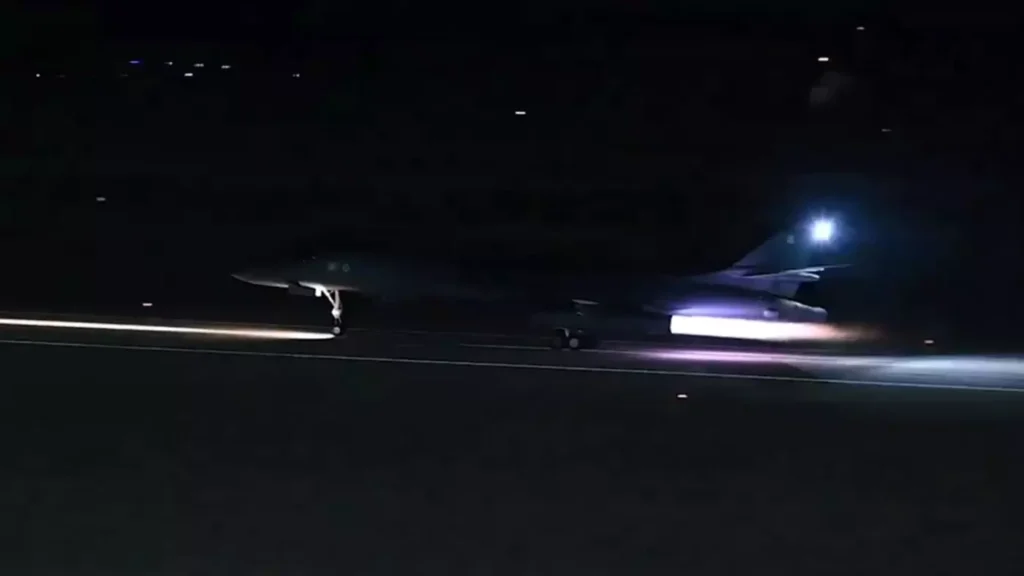Following a drone strike on an American outpost in Jordan that claimed the lives of three troops, the United States on Friday night launched its first round of retaliation strikes against militants backed by Iran in Iraq and Syria, resulting in at least 23 fatalities.
In a statement, the US Central Command (Centcom) said that its troops had hit over 85 targets in Syria and Iraq, including the Quds Force of Iran’s Islamic Revolutionary Guard Corps and other armed groups with ties to both nations.
“The safety of Americans as well as the stability of Iraq and the surrounding area are still directly threatened by Iran’s Islamic Revolutionary Guards Corps (IRGC) Quds Force and associated militia organizations. General Michael Erik Kurilla, the Centcom commander, stated, “We will keep taking action, do whatever is necessary to protect our people, and hold those responsible who threaten their safety.”
Twenty-three pro-Iranian fighters have been killed in the Syria attacks, according to the UK-based Syrian Observatory for Human Rights.
The organization’s president, Rami Abdurrahman, stated, “The toll has risen to 23 dead: 10 pro-Iran fighters in the Deir Ezzor area and 13 in the Mayadeen area.” He also stated that nine of the fighters were Syrians and six were Iraqis.
No recorded civilian fatalities occurred.
Both Damascus and Baghdad denounced the attacks.
Speak for Iraqi Prime Minister Mohamed Shia al-Sudani, General Yehia Rasool claimed the strikes would have “disastrous consequences for the security and stability of Iraq and the region” and were a “violation” of the nation’s sovereignty.
Later, Iraq said that it will be calling the US ambassador to Baghdad to offer a formal protest.
“In protest at the US aggression which targeted Iraqi civilian and military sites, the foreign ministry is going to summon US charge d’affaires David Burger,” a statement from the ministry stated.
The Syrian military said in a statement that the US strikes in the east of the country had resulted in numerous civilian and military deaths, injuries, and significant property damage, both public and private.
It said that the strikes had made it harder for the Syrian army to combat the remaining members of the Islamic State group in the area.
It stated, “There is no justification for the US aggression today dawn; rather, it is an attempt to undermine the Syrian army’s capacity to combat terrorism.”
According to a reporter for Syria’s official Sana news agency, there were explosions audible in the town of Deir Ezzor, and the surrounding areas experienced an electrical outage.
Centcom claims that “more than 125 precision munitions” were deployed in the airstrikes, and that the attacks included “long-range bombers flown from [the] United States” among other aircraft.
According to the US military, among the locations it struck were command and intelligence centers, missile and rocket launchers, and supply chain and logistical establishments.
“We started responding today. It will go on whenever and wherever we choose,” he declared.
“In the Middle East or anywhere else in the globe, the United States does not seek out violence. However, let everyone who would try to hurt us know that we will retaliate if you hurt an American.”
In Syria, one IRGC officer was killed.
In addition, a number of airstrikes were reported in Syria early on Friday, causing confusion ahead of the anticipated operations by the US military. Iranian media sources connected the earlier strikes, which claimed the life of an IRGC officer in a Damascus neighborhood in the south, to Israel.
According to a number of Iranian media sources, the officer was identified as Saeed Alidadi, a military advisor who had been sent to Syria. As is customary for Israeli strikes in Syria, Israel has neither claimed credit for the strike nor made any public statements regarding it.
The Biden administration had promised a “multi-tiered” reaction to the attacks that may take weeks, so Washington had been preparing for it for the last week.
Near the Syrian border, in Jordan, an attack occurred on Sunday that resulted in the deaths of three US soldiers and the injuries of over thirty more.
Reporters were informed by White House spokesperson John Kirby that the attack in Jordan was associated with the “Islamic Resistance in Iraq,” a loose coalition of paramilitaries supported by Iran.
It happened concurrently with a US drone returning to the base, creating uncertainty regarding the nature of the approaching drone. Air defense systems were not immediately engaged as a result.
An umbrella organization known as the Islamic Resistance in Iraq was established in October in reaction to Israel’s Gaza War. Since then, it has attacked US targets in Iraq, Syria, and most recently, Jordan. Additionally, the group has taken credit for assaults that occurred in Israel. The group comprises of pro-Iranian organizations, the most notable of which being Kataib Hezbollah.
The White House spokesperson Kirby stated on Thursday that the US thought the strike in Jordan had “footprints of Kataib Hezbollah.” Kataib Hezbollah declared shortly after that it was going to stop its operations against US forces. No more strikes against the US have occurred in the area since the declaration.
“To avoid embarrassing the Iraqi government, we announce the suspension of military and security operations against the occupation forces,” the paramilitary group’s secretary general, Abu Hussein al-Hamidawi, stated.
“We will continue to defend our people in Gaza in other ways.”
Since the start of the conflict between Israel and Palestine on October 7, more than 150 attacks on US personnel in the area have been carried out by militants supported by Iran. Since October 7, the US has also launched further retaliatory strikes in Syria and Iraq.
The assaults that took place on Friday did not occur within Iran, and earlier this week, Middle East Eye revealed that both current and past US officials expressed doubts about the likelihood of a direct attack on Iran.

